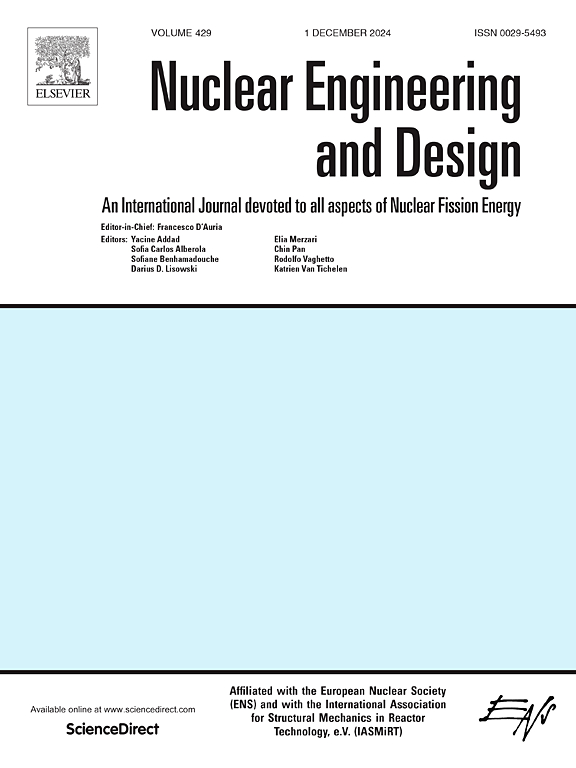Experimental research on heat transfer in a molten salt-heat pipe-thermoelectric generator system based on micro-MSR
IF 1.9
3区 工程技术
Q1 NUCLEAR SCIENCE & TECHNOLOGY
引用次数: 0
Abstract
The heat pipe-cooled micro molten salt reactor (micro-MSR) utilizes heat pipes for transferring the fission energy produced in the core to thermoelectric generators (TEG). In order to assess the heat transfer performance, an integrated experimental setup comprising a molten salt – heat pipe – thermoelectric generator was established. Experiments were carried out to assess the system’s performance during start-up and operation under various operational conditions. Two different methods of salt addition were tested, revealing that the introduction of liquid molten salt led to temperature fluctuations, while the heat pipe start-up process was influenced by the melting of molten salt during cold start-up. During steady power operation, the system exhibited stability, with natural convection of molten salt in the annular gap enhancing heat transfer. The primary factor affecting thermoelectric conversion efficiency was identified as the thermal resistance between the condensation section of the heat pipe and the TEG. With increasing heating temperatures, the wall temperatures of each part of heat pipe rose accordingly, resulting in improving heat transfer efficiency and thermoelectric conversion. This investigation is expected to offer valuable insights for the start-up and operation of micro-MSRs.
求助全文
约1分钟内获得全文
求助全文
来源期刊

Nuclear Engineering and Design
工程技术-核科学技术
CiteScore
3.40
自引率
11.80%
发文量
377
审稿时长
5 months
期刊介绍:
Nuclear Engineering and Design covers the wide range of disciplines involved in the engineering, design, safety and construction of nuclear fission reactors. The Editors welcome papers both on applied and innovative aspects and developments in nuclear science and technology.
Fundamentals of Reactor Design include:
• Thermal-Hydraulics and Core Physics
• Safety Analysis, Risk Assessment (PSA)
• Structural and Mechanical Engineering
• Materials Science
• Fuel Behavior and Design
• Structural Plant Design
• Engineering of Reactor Components
• Experiments
Aspects beyond fundamentals of Reactor Design covered:
• Accident Mitigation Measures
• Reactor Control Systems
• Licensing Issues
• Safeguard Engineering
• Economy of Plants
• Reprocessing / Waste Disposal
• Applications of Nuclear Energy
• Maintenance
• Decommissioning
Papers on new reactor ideas and developments (Generation IV reactors) such as inherently safe modular HTRs, High Performance LWRs/HWRs and LMFBs/GFR will be considered; Actinide Burners, Accelerator Driven Systems, Energy Amplifiers and other special designs of power and research reactors and their applications are also encouraged.
 求助内容:
求助内容: 应助结果提醒方式:
应助结果提醒方式:


